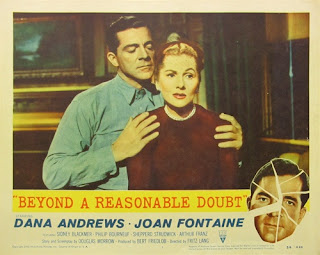I try very hard to avoid spoilers in the films we discuss; quite frankly, this is a hard one. The main reason being that the film seems to be going along on a traditional plain. You are sure you know where it is going and how it will end. And then everything hits the fan, and you are gobsmacked to find you were completely wrong. Our group went into this film knowing very little about it, and we were glad; the beauty of the film is in the surprise towards the end.
Dana Andrews is excellent as the writer who is attempting to bring down a District Attorney (Philip Bourneuf as Roy Thompson). He's treading a fine line in the film, and he does it beautifully. You would never believe that he was in the midst of an alcoholic crises that resulted in his arriving at the studio late with immense hangovers and after automobile accidents (Hollywood Enigma: Dana Andrews by Carl Rollyson). It would take awhile, but Mr. Andrews was able to control his illness by the late 1960s. In 1972, he became a spokesman for the National Council on Alcoholism and Drug Dependence and was able to say he had not had a drink in four years (New York Times).
We were not as impressed with Joan Fontaine (Susan Spencer). Susan is a decidedly unappealing character - she's spoiled, she's unemotional; Ms. Fontaine seems stiff and uncomfortable in the role. One never feels any love between her and Tom. When she reads a newspaper article that shows him slumming with exotic dancer Sally Moore (Barbara Nichols), Susan is offended that Tom has publicly embarrassed her. She seems far less concerned that he is sleeping with another woman. Ms. Fontaine holds the character distant from everyone, and Susan is uninterested in anything that requires thinking. With a father as intelligent as Austin Spencer, one expects a daughter more like Polly Fulton in B.F.'s Daughter. What Ms. Fontaine gives us is an enigma who cares for nothing.
While one is never sure of the motives of Roy Thompson, Jonathan Wilson (Shepperd Strudwick) and Bob Hale (Arthur Franz) are portrayed as lawyers who are honorable. The discussions between Hale and Thompson in particular, are fascinating, and display Bob's ethics in contrast with Roy's ambitions.
This was director Fritz Lang's final film in America (TCM article). In fact, film editor Gene Fowler, Jr. put the film together with Lang's instructions - the director had already left the country. The director of M (1931) and Fury (1936) would make three more films in Germany; after which he essentially retired. Upon retirement, he returned to Los Angeles, where he died in 1976, at the age of 85.
Before Bert Friedlob acquired the script, Ida Lupino had intended it as a vehicle for herself, Howard Duff and Joseph Cotton (AFI Catalog). Unfortunately, the film didn't do well on release and received mixed reviews. Variety called it a "melodrama [that] never really jells." The New York Times review by Bosley Crowther, however, praised the "forceful" Mr. Andrews and said that "this a fairly intriguing and brain-teasing mystery film."
In recent years, the film has been discussed in a more positive light, as is demonstrated by these articles in Cineast and The Guardian. It was remade in 2009 with Michael Douglas as the prosecutor.
We'll leave you with a trailer from the film. Try to avoid spoilers before you view this movie. You'll appreciate the surprise.





No comments:
Post a Comment
Thanks for your interest in this blog. Your comments will be moderated to minimize spam to the website. Thanks for understanding.